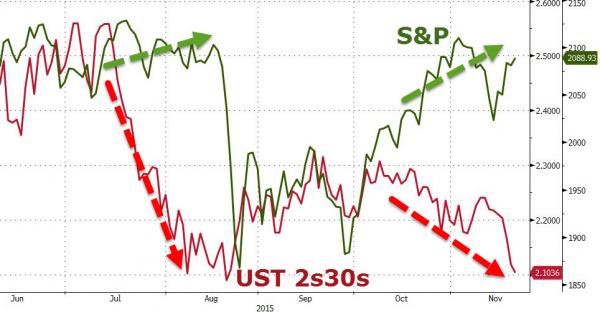Seven years after the Fed unleashed ZIRP and QE to “fix the economy”, it has finally admitted that ZIRP and QE failed to do that (although they certainly succeeded in blowing the biggest asset bubble ever), and for the past 6 months the Fed has engaged in what may be the most ridiculous case of revisionist history, as the narrative has been flipped on its head, and now the all too wise career economists of the Fed (with the help of a few good ex-Goldman bankers) are pitching the first rate hike in nearly a decade as the solution to all the economy’s problems.
For now the equity market has played along with this grotesque flip-flop in monetary policy, first by rising two months ago on terrible job numbers which made the December rate hike less realistic, and then rising some more in the aftermath of the October “hawkish” Fed announcement and minutes, which in no uncertain terms warned a December rate hike is coming after all, poor economic data be damned.
To be sure, while stocks as usual remain stuck in their imaginary ivory tower where good news is great, and bad news is even greater, other assets have been far less enthusiastic. In fact, as we have shown repeatedly, the dramatic flattening of the yield curve (via the 2s30s) is now screaming policy error.

Yet if bonds foresee a major monetary policy “error” why do stocks remain oblivious? One attempt at an answer was provided by Goldman late last week when the firm suggested that the natural rate of the economy (to which the Fed will hike rates before re-easing) has declined and will remain lower for longer: in other words, the Fed’s experiment has weakened the economy so much, its potential growth rate has been cut in half in the past decade.
To Goldman this was, as can be expected, bullish for stocks and bearish for bonds (ironically even as another part of Goldman is saying that the “Bernanke put” is now gone and has been replaced with the “Yellen call”, which is why Goldman’s 2016 year end target is an unchanged market).











Leave A Comment